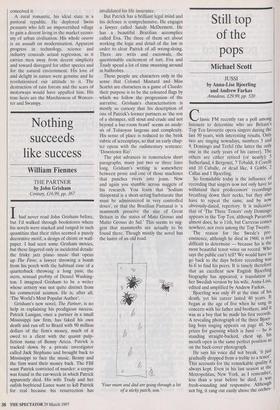Nothing succeeds like success
William Fiennes
THE PARTNER by John Grisham Century, £16.99, pp. 367 Ihad never read John Grisham before, but I'd walked through bookstores where his novels were stacked and ranged in such quantities that their titles seemed a purely decorative motif, a design of chintz or wall- paper. I had seen some Grisham movies, but these lingered only in incidental details: the frisky jazz piano music that opens up The Firm; a lawyer throwing a bomb from his porch with the habitual ease of a quarterback throwing a long pass; the stern, sensual probity of Denzel Washing- ton. I imagined Grisham to be a writer whose artistry was not quite distinct from his commercial acumen. He is, after all, 'The World's Most Popular Author'.
Grisham's new novel, The Partner, is no help in explaining his prodigious success. Patrick Lanigan, once a partner in a small Mississippi law firm, has faked his own death and run off to Brazil with 90 million dollars of the firm's money, much of it owed to a client with the quaint pulp- fiction name of Benny Aricia. Patrick is tracked down by a private investigator called Jack Stephan° and brought back to Mississippi to face the music. Benny and the firm want their money back. The FBI want Patrick convicted of murder: a corpse was found in the car-wreck in which Patrick apparently died. His wife Trudy and her oafish boyfriend Lance want to kill Patrick for real because his resurrection has
invalidated his life insurance.
But Patrick has a brilliant legal mind and his defence is comprehensive. He engages a lawyer called Sandy McDermott. He has a beautiful Brazilian accomplice called Eva. The three of them set about working the logic and detail of the law in order to clear Patrick of all wrong-doing. There are writs and escrowals, the questionable excitement of tort. Eva and Trudy spend a lot of time swanning around in bathrobes.
These people are characters only in the sense that Colonel Mustard and Miss Scarlet are characters in a game of Cluedo: their purpose is to be the coloured flags by which we follow the progression of the narrative. Grisham's characterisation is mostly so cursory that his description of one of Patrick's former partners as 'the son of a shrimper, still stout and crude and not beyond a bar-room brawl' seems an analy- sis of Tolstoyan largesse and complexity. His sense of place is reduced to the brisk rubric of screenplays, so that an early chap- ter opens with the rudimentary sentence: 'Downtown Rio'.
The plot advances in remorseless short paragraphs, many just two or three lines long. Grisham's writing is somewhere between prose and one of those machines that punches rivets into jeans. Now and again you stumble across nuggets of his research. You learn that 'Sodium thiopental is a short-acting barbiturate that must be administered in very controlled doses', or that the Brazilian Pantanal is 'a mammoth preserve the size of Great Britain in the states of Mato Grosso and Matto Grosso do Sul.' This seems to sug- gest that mammoths are actually to be found there. Though mostly the novel has the lustre of an old road.
'Your mum and dad are going through a bit of a sticky patch, son.'


































































 Previous page
Previous page